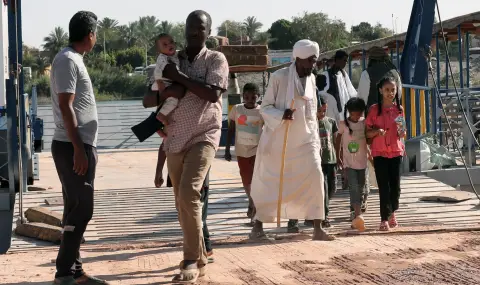For years, resource-rich Sudan was terrorized by dictator Omar al-Bashir, before to be overthrown in a coup in 2019. However, the happiness of the Sudanese did not last long - the country fell into the trap of a bloody power struggle.
For 16 months now, two generals have been fighting for control without considering the consequences. Millions of people are displaced in the country, millions are starving. Ceasefire and humanitarian aid negotiations are underway in Switzerland, but the signals are not encouraging.
"The situation is terrifying"
"The situation in Khartoum is indescribable and truly horrifying,” said Khalid Mishain, a youth NGO spokesman who recently fled the devastated capital Khartoum. He told dpa that every day they receive information about people being shot in their homes, and government forces indiscriminately bomb residential complexes that are under the control of the opposition "Rapid Reaction Forces".
A few days ago, several children were killed and others were injured when they were shot at while playing soccer in a field that was declared a "safe zone for children". UNICEF spokesman James Elder said that he visited the surviving children in one of the hospitals in the capital of Sudan. "None of them will ever want to play football again," he says.
Famine, displacement and natural disasters
Nearly 26 million people are at risk of starvation - more than half of the country's population. 755 thousand people are on the brink of starvation, according to UN analyses. A state of emergency has already been declared in the Samsam refugee camp in North Darfur because of the lack of food. About half a million refugees are there. 10.7 million Sudanese are internally displaced and over 2 million have fled the country to neighboring countries.
According to UN estimates, at least one hundred people die every day from starvation in Sudan, and at least 30% of all children in the country suffer from severe malnutrition. In addition to the armed conflict, the population of Sudan has also had to deal with torrential rains and floods that have destroyed houses and roads and forced tens of thousands to flee their homes.
Humanitarian aid is obstructed
Elder says he spoke with a nurse who had cared for hundreds of girls and women who had been raped, including children as young as eight. Human rights activist Mahmoud Alzain also reported sexual assaults and looting. "We have been informed of more than a hundred people who were abducted by the Rapid Reaction Force," Alzain said. It is not clear whether they are alive - the militants shoot at women, children and the elderly indiscriminately, the human rights defender explains.
According to the UN, both parties to the conflict systematically obstruct the delivery of the necessary humanitarian aid. On the one hand, unnecessary bureaucratic hurdles have been created, and on the other, UN food convoys are often held up at checkpoints for days on end, Mohamed Refaat, UN humanitarian aid coordinator in Sudan, told dpa.
In addition, the organization does not have the necessary funds for all those in need. Of the $2.7 billion needed for this year, only a third is available.
Is there any prospect of a truce?
The US invited representatives of the government forces and the opposition "Rapid Reaction Forces" of ceasefire talks taking place at an undisclosed location in Switzerland. The talks are expected to last until August 24 and allow more humanitarian aid to enter Sudan. At the moment, the political future of the country is not a topic of conversation, said the UN Special Representative for Sudan Tom Periello.
For now, however, only the representatives of the "Rapid Reaction Forces" have announced that they will participate in these negotiations. That is why, in the first place, the possibility of increasing humanitarian aid will be discussed. In order to achieve this, however, the consent of both sides is necessary, as humanitarian workers cannot risk their lives by entering the war zone.
Mina Kirkova editor
